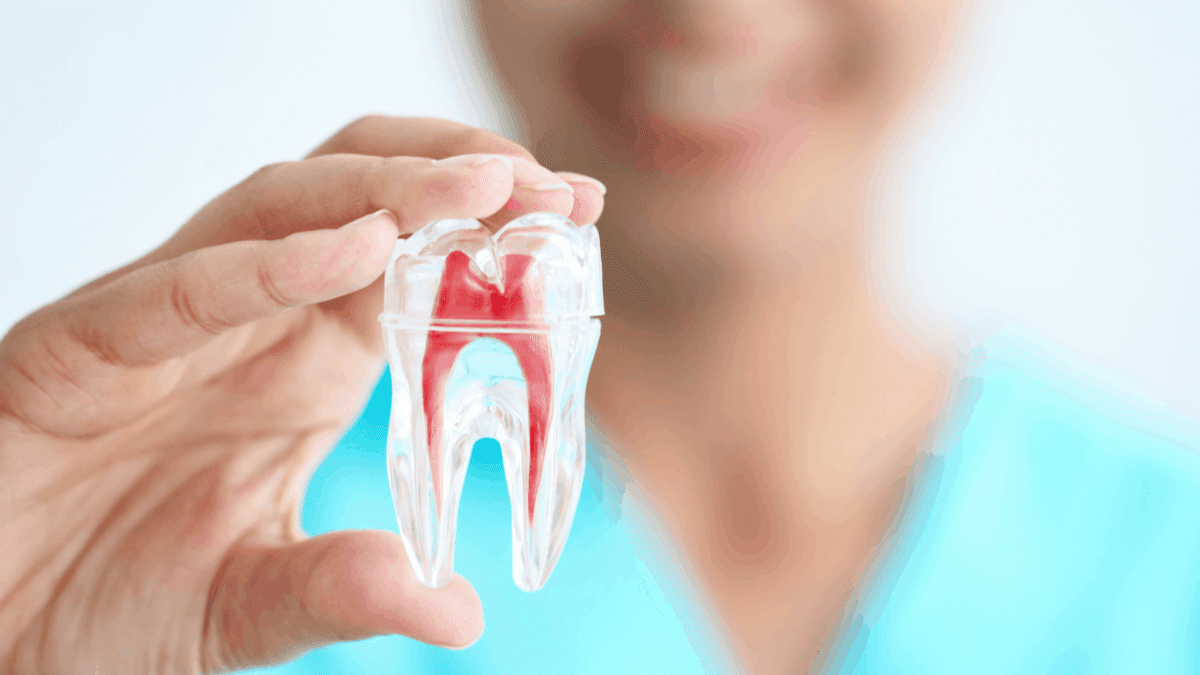Do You Need a Root Canal? 7 Telltale Symptoms
A root canal is the name of the dental procedure that cleans out the decay in your tooth’s pulp and root.
Your teeth have an enamel layer on the outside, a second layer of dentin, and a soft inside core that extends into the root in your jawbone. The core contains the dental pulp, which consists of nerves, blood vessels, and connective tissue.
When decay gets into the soft core, the pulp can become inflamed or infected, or even necrotic (dead). A root canal is needed to clean out the decay.
So, how do you know if you need a root canal? Are there telltale signs? Keep reading to learn more about the symptoms that may indicate you need a root canal.
What is a root canal?
A root canal procedure is like a tiny Roto-Rooter, cleaning out decay and preserving the infected tooth.
During a root canal procedure, your dentist will:
- extract bacteria and decay from the tooth pulp, root, and nerve
- disinfect the area with antibiotics
- fill the empty roots
- seal the area to prevent new decay
A root canal can be done by your general dentist or a specialist known as an endodontist.
The root canal treatment leaves your natural tooth in place and prevents further decay. But it makes the tooth more fragile. That’s why a tooth that’s had a root canal is often covered with a crown.
1. Persistent pain
Persistent tooth pain is one of the signs that you may need a root canal. The pain in your tooth might bother you all the time, or it might go away from time to time but always return.
You may feel the pain deep in the bone of your tooth. Or you may feel referred pain in your face, jaw, or in your other teeth.
Tooth pain may have other causes besides root canal. Some other possibilities include:
- gum disease
- a cavity
- referred pain from a sinus infection or another problem
- a damaged filling
- an impacted tooth that may be infected
No matter what the cause, it’s a good idea to see your dentist if you have tooth pain, especially if the pain is persistent. Early diagnosis and treatment for tooth pain typically leads to a better outcome.
2. Sensitivity to heat and cold
Does your tooth hurt when you eat warm food or when you drink a cup of coffee? Or perhaps your tooth feels sensitive when you eat ice cream or drink an icy-cold glass of water.
The sensitivity could feel like a dull ache or a sharp pain. You may need a root canal if this pain lingers for an extended period of time, even when you stop eating or drinking.
If your tooth hurts when you eat or drink something hot or cold, it may be an indication that the blood vessels and nerves in your tooth are infected or damaged.
3. Tooth discoloration
An infection in the pulp of your tooth can cause your tooth to become discolored.
Trauma to the tooth or the breakdown of the internal tissue can damage the roots and give the tooth a grayish-black appearance.
According to Kenneth Rothschild, DDS, FAGD, PLLC, who has 40 years of experience as a general dentist, this discoloration is easier to see in a front (anterior) tooth.
“Tooth pulps can die when there’s an inadequate blood supply, thus signaling a possible need for a root canal,” Rothschild explained.
Although tooth discoloration can have other causes, it’s always a good idea to see your dentist if you notice that a tooth is changing color.
4. Swollen gums
Swollen gums near the painful tooth can be a sign of an issue that requires a root canal. The swelling may come and go. It may be tender when you touch it, or it may not be painful to the touch.
“Swelling is caused by acidic waste products of dead pulp tissues, which may lead to swelling (edema) outside the root tip area,” explained Rothschild.
You may also have a little pimple on your gum. This is called a gum boil, parulis, or abscess.
The pimple may ooze pus from the infection in the tooth. This can give you an unpleasant taste in your mouth and make your breath smell bad.
5. Pain when you eat or touch the tooth
If your tooth is sensitive when you touch it or when you eat, it could indicate severe tooth decay or nerve damage, which may need to be treated with a root canal. This is especially the case if the sensitivity persists over time and doesn’t go away when you stop eating.
“The ligament around the root tip of an infected tooth may become hypersensitive from the pulp dying. The waste products from the dying pulp may irritate the ligament, causing pain from biting pressure,” said Rothschild.
6. A chipped or cracked tooth
If you’ve chipped or cracked your tooth in an accident, in a contact sport, or by chewing on something hard, bacteria can set in and lead to inflammation and infection.
Even if you injure a tooth, but it doesn’t chip or crack, the injury may still damage the nerves of the tooth. The nerve can become inflamed and cause pain and sensitivity, which may require root canal treatment.
7. Tooth mobility
When your tooth is infected, it may feel looser.
“This can be caused by other factors besides pulpal necrosis (nerve death), but it can be a sign that a root canal is necessary,” said Rothschild. “Acidic waste products from nerve death can soften the bone around the root of a dying tooth, causing mobility.”
If more than one tooth feels loose, the mobility is likely to have a cause other than an issue that may need a root canal.
Does a root canal hurt?
A root canal procedure sounds scary, but with today’s technology, it’s typically not a whole lot more different than having a deep filling. There’s little to no pain because your dentist will use local anesthesia to numb your tooth and gums so you’re comfortable during the procedure.
If you need a root canal and have facial swelling or a fever, your dentist may give you antibiotics beforehand to kill the infection. This may also help reduce your pain.
The root canal procedure itself is similar to getting a large filling, but it’ll take longer. Your mouth will be numbed while the dentist cleans out the decay, disinfects the roots, and then fills them in.
Your dentist will use a rubber dam around the root canal tooth. This will help prevent any infected material from spreading to the rest of your mouth.
Your mouth may feel sore or tender after the root canal. Your dentist may suggest that you take an over-the-counter pain medication such as acetaminophen (Tylenol) or ibuprofen (Advil).
A 2011 review of 72 studies of root canal patients looked at pre-treatment, treatment, and post-treatment pain.
The analysis found that pre-treatment pain was high, but dropped moderately within a day of treatment, and then dropped substantially to minimal levels within a week.
How to prevent a root canal
To prevent a root canal, it’s important to follow the same dental hygiene habits that help prevent cavities and other tooth problems. To keep your teeth healthy, try to get into the habit of following these steps:
- Brush your teeth at least twice a day.
- Floss between your teeth at least once a day.
- Use fluoride toothpaste or a fluoride rinse.
- See your dentist for checkups every 6 months.
- Have your teeth professionally cleaned by your dentist at least once a year.
- Try to limit the amount of sugary food and refined carbohydrates you eat. These foods have a tendency to stick to your teeth. If you eat sugary foods, try to rinse your mouth or brush your teeth shortly afterward.
Can you still get pain in a tooth that’s had a root canal?
Yes, it’s possible to have pain in a tooth that’s had a prior root canal.
Some causes of this pain may be due to:
- your root canal not healing properly
- your root canal not being completely disinfected because of complicated root anatomy
- new decay can infect the root canal filling material, causing a new infection
- a tooth injury that allows new decay to enter the tooth
According to the AAE, re-treatment — meaning another root canal — is the best option to treat the pain and any other symptoms.
The bottom line
An infection inside your tooth’s pulp and root can cause discomfort and pain. If you have persistent tooth pain or other symptoms, see your dentist as soon as possible to get a diagnosis and treatment.
Although the term “root canal” seems to provoke fear in many people, the dental procedure doesn’t involve any special pain. Almost all people feel better shortly after treatment.
Author: healthline.com
Article originally appeared at: https://www.healthline.com



